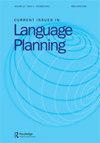家庭语言规划生态的转变:新冠肺炎期间的匈牙利裔澳大利亚家庭
IF 1.8
1区 文学
Q2 EDUCATION & EDUCATIONAL RESEARCH
引用次数: 2
摘要
本研究采用混合方法调查在澳大利亚抚养孩子的匈牙利家庭的家庭语言计划(FLP)。本研究旨在探讨影响家庭贫困的复杂因素,以及家庭如何应对新冠肺炎疫情期间快速变化的社会条件。这场大流行病凸显了家庭领域不断变化的时空动态。因此,该项目寻求对不断变化的家庭生态的整体洞察,将语言使用模式、动机、语言维护和学习策略以及家庭福祉结合起来。通过在线调查(N = 80)和家长访谈(N = 13)收集数据。研究结果为跨代语言维持的跨地域和跨国维度提供了实证证据。本文主张在语言规划中采用生态方法,该方法认识到家庭领域复杂的社会、情感和意识形态维度以及语言规划的跨地域方面。结果表明,匈牙利家庭以截然不同的方式经历了2019冠状病毒病的影响:对一些人来说,家庭领域出现了新的机会,成为一个充满活力的多语言空间;对另一些人来说,社会隔离进一步减少了传统语言的空间。因此,机构对于应对这些变化的情况至关重要。©2023 Informa UK Limited以Taylor & Francis Group的名义进行交易。本文章由计算机程序翻译,如有差异,请以英文原文为准。
Shifting ecologies of family language planning: Hungarian Australian families during COVID-19
This study took a mixed-methods approach to investigate family language planning (FLP) in Hungarian families raising children in Australia. The study aimed to explore the complex factors impacting FLP and how families responded to the rapidly changing social conditions during the outbreak of Covid-19. The pandemic highlighted the shifting spatiotemporal dynamics of the family domain. Therefore, the project sought a holistic insight into the shifting family ecology, incorporating language use patterns, motivations, language maintenance and learning strategies and family well-being. Data were collected through an online survey (N = 80) and parental interviews (N = 13). The findings provide empirical evidence of the translocal and transnational dimensions of intergenerational language maintenance. The paper argues for an ecological approach in FLP, which recognises the complex social, affective and ideological dimensions of the family domain and the translocal aspects of language planning. As the results demonstrate, Hungarian families experienced the impact of Covid-19 in contrastive ways: for some, new opportunities arose to establish the home domain as a dynamic multilingual space;for others, the social isolation further reduced the space afforded to the heritage language. Therefore, agency was crucial for responding to these shifting circumstances. © 2023 Informa UK Limited, trading as Taylor & Francis Group.
求助全文
通过发布文献求助,成功后即可免费获取论文全文。
去求助
来源期刊

Current Issues in Language Planning
Multiple-
CiteScore
4.80
自引率
16.70%
发文量
26
期刊介绍:
The journal Current Issues in Language Planning provides major summative and thematic review studies spanning and focusing the disparate language policy and language planning literature related to: 1) polities and language planning and 2) issues in language planning. The journal publishes four issues per year, two on each subject area. The polity issues describe language policy and planning in various countries/regions/areas around the world, while the issues numbers are thematically based. The Current Issues in Language Planning does not normally accept individual studies falling outside this polity and thematic approach. Polity studies and thematic issues" papers in this journal may be self-nominated or invited contributions from acknowledged experts in the field.
 求助内容:
求助内容: 应助结果提醒方式:
应助结果提醒方式:


